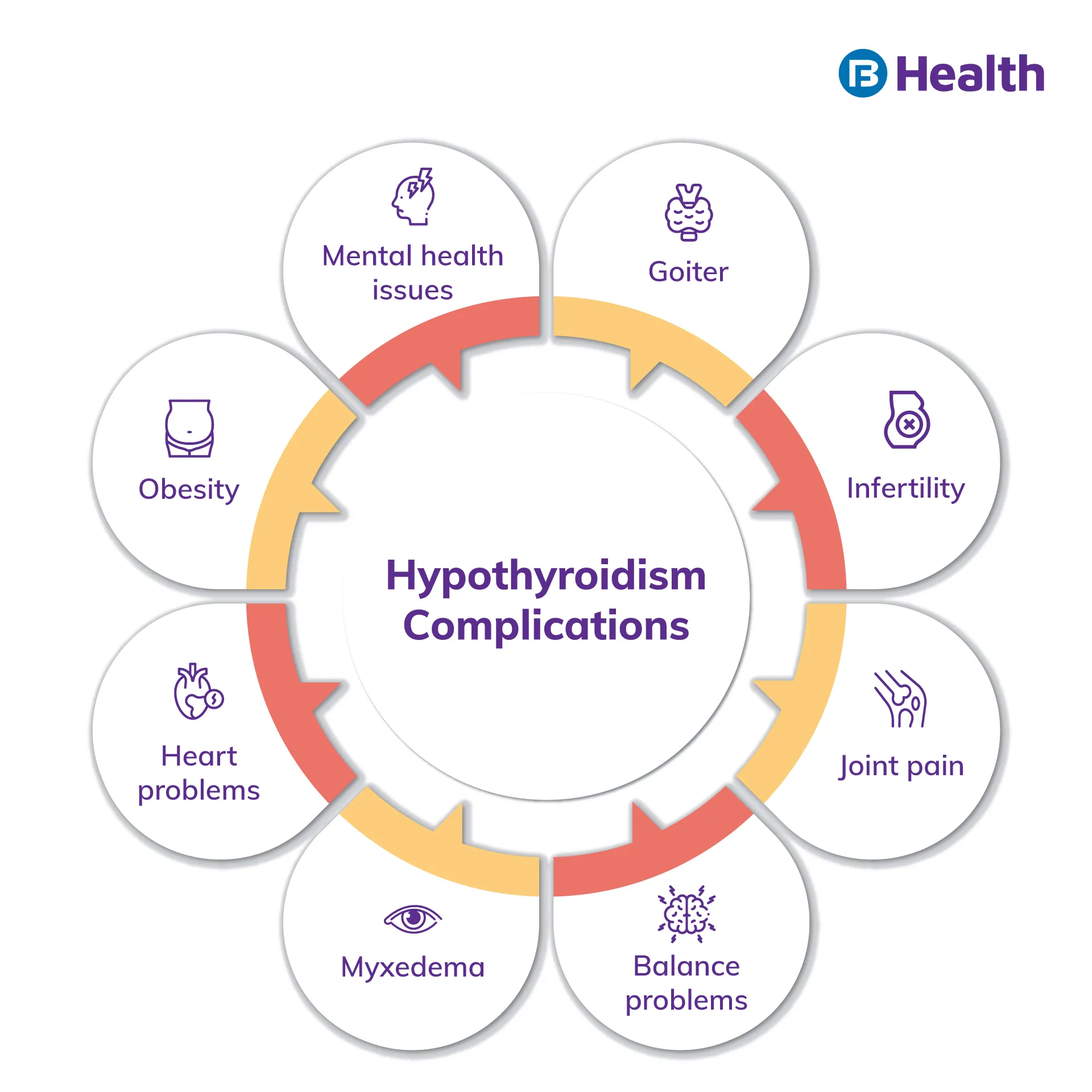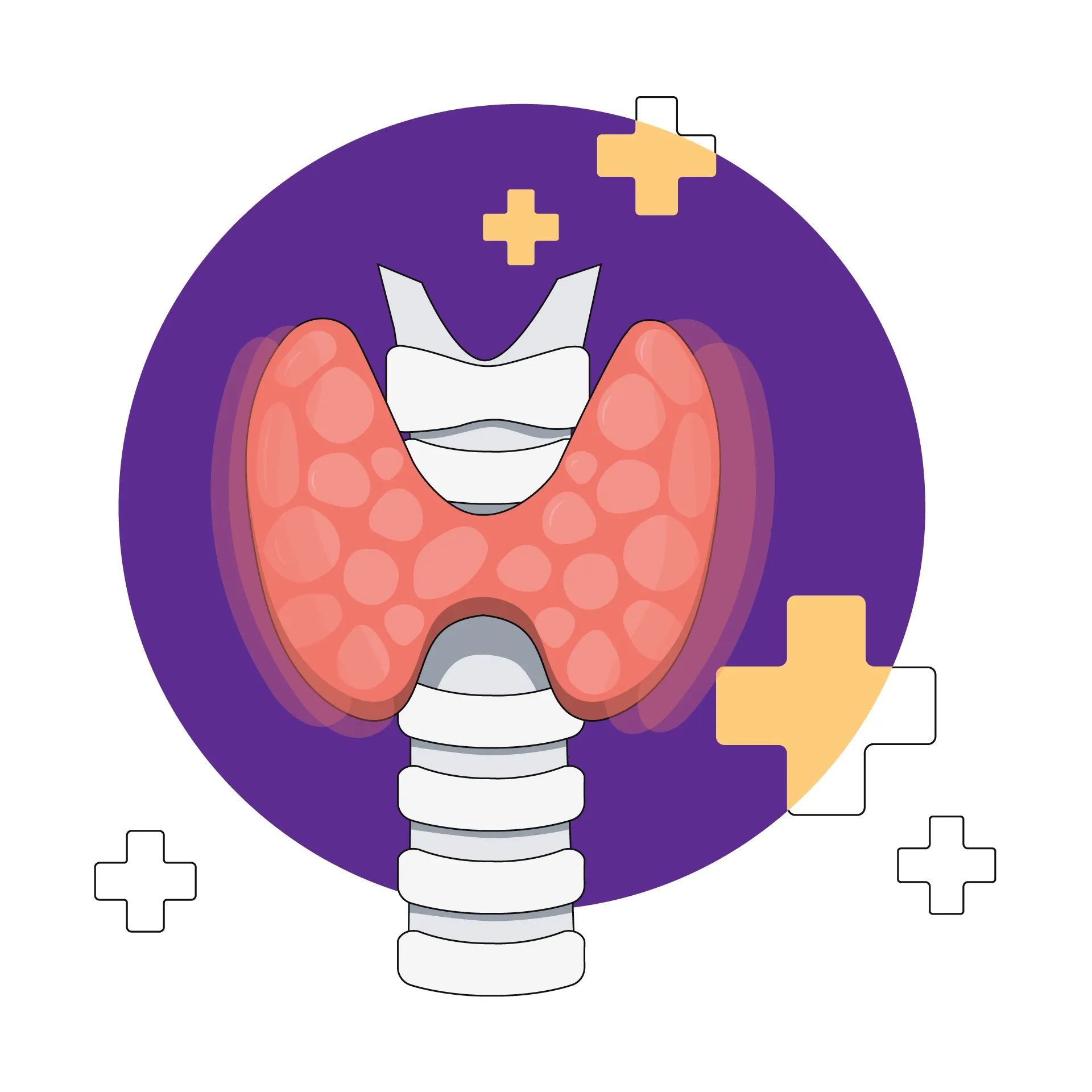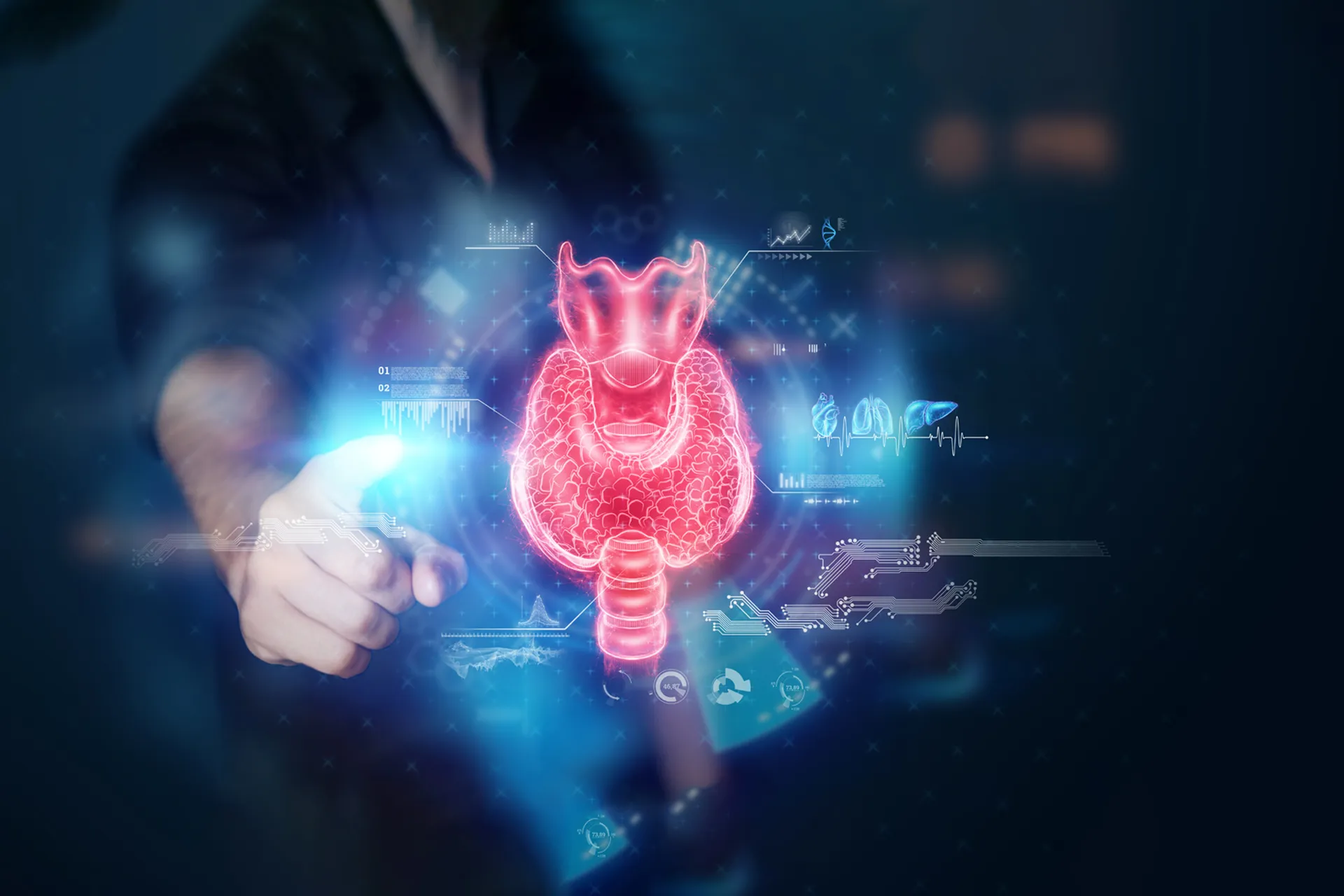Thyroid | 8 min read
Hypothyroidism: Early Symptoms, Causes, Risk Factor and Test
Medically reviewed by
Table of Content
Key Takeaways
- Hyperthyroidism and hypothyroidism are common thyroid problems
- Fatigue, insomnia, and weakness are some hypothyroidism symptoms
- Women and men above 60 years are more at risk of hypothyroidism
The thyroid is an endocrine gland that produces hormones [1]. Hyperthyroidism and hypothyroidism are common problems involving it. Hyperthyroidism or overactive thyroid occurs when your thyroid gland produces excessive amounts of the hormone thyroxine. Hypothyroidism or underactive thyroid is a condition where your thyroid gland does not produce enough hormones.
It is alarming that around 42 million people in India have thyroid problems. Out of these, hypothyroidism is the most common condition with 1 in 10 people getting affected [2]. Read on to know more about hypothyroidism, its causes, complications, and treatments.
What Is Hypothyroidism?
Hypothyroidism is a condition in which the thyroid gland doesn't produce enough thyroid hormone. It can happen for various reasons, including autoimmune disease, damage to the thyroid gland, or certain medications.[4]
Symptoms of hypothyroidism can vary from mild to severe and can include fatigue, weight gain, cold intolerance, dry skin, and hair loss.
You must see your doctor for a diagnosis if you think you may have hypothyroidism. Once hypothyroidism is diagnosed, it can be treated with medication.
How Does Thyroid Work?
Your thyroid is a butterfly-shaped gland in your neck, just above your collarbone. It's an endocrine gland, which means it makes hormones. The thyroid's job is to release those hormones into the bloodstream, which travels to all body parts. There, they help to regulate metabolism—the process by which your body converts food into energy.
If your thyroid isn't working correctly, it can cause various problems, including fatigue, weight gain or loss, and mood swings. If you suspect you have a thyroid problem, you must see your doctor and get treatment.[4]
What is Thyroid?
The thyroid is a butterfly-shaped endocrine gland in your neck. It produces thyroxine (T4) and triiodothyronine (T3) hormones. Your body needs these for normal functioning [3]. Thyroid hormones support many activities including how fast your heart beats and the rate at which you burn calories.
Additional Read: Signs of Hyperthyroidism and Hypothyroidism
Early Hypothyroidism Symptoms
Early hypothyroidism symptoms can often be subtle and may go unnoticed. However, if you know what to look for, you can catch the problem early and get treatment.
The most common early symptom of hypothyroidism is fatigue. You may always feel tired, even if you sleep a whole night. Other early symptoms can include weight gain, feeling cold all the time, constipation, dry skin, and hair loss.
If you notice any of these symptoms, you must see your doctor. They can perform a simple blood test to check your thyroid hormone levels. If the levels are low, they can prescribe medication to help get your thyroid back on track.
Detecting and treating hypothyroidism is essential. If it is left untreated, it can lead to more severe problems like heart disease, infertility, and joint pain. So if you're feeling any early symptoms, don't hesitate to see your doctor.
Hypothyroidism Symptoms
Hypothyroidism is a medical condition that occurs when the thyroid gland doesn't produce enough hormones. The most common symptom of hypothyroidism is an enlarged thyroid gland, which can cause a goiter. Other symptoms include:
Here are some hypothyroidism symptoms you should watch out for:
- Anemia
- Fatigue
- Dry skin
- Puffy face
- Goiter
- Hair loss
- Dry skin
- Hoarseness
- Thinning hair
- Depression
- Weak muscles
- Constipation
- Menorrhagia
- Constipation
- Weakness
- Loss of libido
- Change in voice
- Pins and needles
- Slow heart rate
- Impaired memory
- Memory problems
- Decrease in sweating
- Joint pain and swelling
- Carpal tunnel syndrome
- Rapid weight gain
- Muscle aches and stiffness
- Irregular periods
- Difficulty with concentration
- High blood cholesterol levels
- Sleeping difficulties or insomnia
- Urinary and respiratory tract infections
- Increased sensitivity to cold temperatures

Hypothyroidism Causes
Here are the common causes of hypothyroidism.
- Damage to your thyroid gland from radiation therapy or surgery
- Constipation
- Dry skin
- Depression
- Irritability
- Autoimmune disorders such as Hashimoto’s thyroiditis, inflammation of the thyroid gland
- Radiation therapy to the neck for treating cancers like lymphoma
- Radioactive iodine treatment to treat overactive thyroid
- Certain medications used to treat cancer, heart problems, and psychiatric conditions
- Thyroid surgery
- Iodine deficiency
- Pregnancy, which can lead to inflammation of the thyroid
- Congenital hypothyroidism, when the thyroid gland does not work or develop properly at birth
- Issues with the pituitary gland
- Hypothalamus disorder
What Causes Hypothyroidism in Pregnancy?
There are many possible causes of hypothyroidism during pregnancy. It may be due to an autoimmune disorder like Hashimoto's disease. It could also be caused by certain medications, iodine deficiency, or a history of thyroid problems.[4][5]
Hypothyroidism can lead to serious health problems for both mother and child. If not treated, it can cause problems with the baby's growth and development. It can also induce preterm labor and low birth weight. If you're pregnant and have any concerns about hypothyroidism, be sure to talk to your doctor.
Hypothyroidism Risk Factors
There are several risk factors for hypothyroidism, and it is essential to be aware of them. Some of the most common include:[5]
- A family history of the condition
- Being a female
- Having another autoimmune condition
- Being over the age of 60
- Having had radiation therapy to the neck or head
If you have any of these risk factors, it is essential to be monitored by a doctor and to get regular blood tests to check your thyroid hormone levels. Early diagnosis and treatment of hypothyroidism are necessary to prevent any long-term complications.
Other hypothyroidism risk factors include the following.
- People older than 60 years of age are more at risk of hypothyroidism
- Being white or Asian increases the risk of the condition
- Women are at more risk than men
- Those with a family history of thyroid disease are at increased risk
- Autoimmune diseases such as rheumatoid arthritis, type 1 diabetes, celiac disease, and multiple sclerosis
- Other diseases like Bipolar disorder, Down syndrome, and Turner syndrome
Difference Between Hypothyroidism and Hyperthyroidism
There are two main types of thyroid disorders: hypothyroidism and hyperthyroidism. Both conditions involve an imbalance of thyroid hormones in the body.
- Hypothyroidism is when the thyroid gland doesn't produce enough thyroid hormones. It can lead to weight gain, fatigue, and other symptoms.
- Hyperthyroidism is when the thyroid gland produces too much thyroid hormone. It can lead to weight loss, anxiety, and other symptoms.
So, what's the difference between the two? Let's take a closer look.
An autoimmune disorder typically causes hypothyroidism. At the same time, hyperthyroidism can be caused by Graves' disease, an overactive thyroid, or thyroid cancer.
Symptoms of hypothyroidism can include weight gain, fatigue, depression, and dry skin. Symptoms of hyperthyroidism can include weight loss, anxiety, tremors, and irritability.
Treatment for hypothyroidism usually involves taking synthetic thyroid hormones. Treatment for hyperthyroidism may include taking beta-blockers, surgery, or radioactive iodine.
If you think you may have either hypothyroidism or hyperthyroidism, it's important to see your doctor for a diagnosis. [4]
Diagnosis of Hypothyroidism
The most common way to diagnose hypothyroidism is with a blood test. It will measure the level of thyroxine in your blood.
If the test shows low thyroxine levels, your doctor will likely diagnose you with hypothyroidism. Treatment for hypothyroidism usually involves taking a daily supplement of thyroxine.
If you have hypothyroidism, you must manage the condition by working with your doctor. With proper treatment, you can live a healthy and active life.[5]
Hypothyroidism Treatment Options
Usually, your physician will prescribe a synthetic thyroid hormone such as levothyroxine, an oral medicine. It is man-made thyroxine that you need to take every day. It replaces thyroxine and helps reverse your hypothyroidism symptoms. Several medications can interfere with this course. Let doctors know about any medicines you take before they create a treatment plan for you.
Hypothyroidism treatment focuses on controlling the condition by supplementing the thyroid hormone. Your doctor may adjust your medication dose over time. To do this right, you will need to go for regular blood tests to check the levels of the thyroid hormone. Your doctor may also advise you to have an adequate amount of iodine as its deficiency can affect thyroid function.
Types of Thyroid Tests
Here are the blood tests that your doctor may order for measuring the levels of thyroid hormones.
- T3 test - It is used in diagnosing hyperthyroidism or to determine its severity
- T4 test - It helps know how the thyroid gland is functioning
- TSI test - It helps measure thyroid-stimulating immunoglobulin
- TSH test - This accurate test measures the TSH level in your blood
- Antithyroid antibody test - The test measures antibodies in the blood
Complications of Hypothyroidism
There are several potential complications associated with hypothyroidism, and it is vital to be aware of them. Hypothyroidism can lead to goiters, heart problems, and even death if left untreated. While you can effectively manage most cases of hypothyroidism with medication, it is still essential to be aware of the potential complications.[5]
You can manage hypothyroidism by taking medications and making lifestyle changes. An easy way to do this is to book an online medical consultation on Bajaj Finserv Health. Consult with the best doctors near you and enjoy the deals and discounts. You can also book health check-ups including a TSH test on the platform.
References
- https://medlineplus.gov/thyroiddiseases.html
- https://www.downtoearth.org.in/news/health/1-in-10-indians-have-hypothyroidism-61693#:~:text=42%20million%20people%20in%20India,enough%20of%20certain%20important%20hormones
- https://www.btf-thyroid.org/what-is-thyroid-disorder
- https://my.clevelandclinic.org/health/diseases/12120-hypothyroidism
- https://www.webmd.com/women/hypothyroidism-underactive-thyroid-symptoms-causes-treatments
Disclaimer
Please note that this article is solely meant for informational purposes and Bajaj Finserv Health Limited (“BFHL”) does not shoulder any responsibility of the views/advice/information expressed/given by the writer/reviewer/originator. This article should not be considered as a substitute for any medical advice, diagnosis or treatment. Always consult with your trusted physician/qualified healthcare professional to evaluate your medical condition. The above article has been reviewed by a qualified doctor and BFHL is not responsible for any damages for any information or services provided by any third party.





